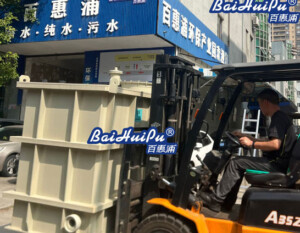جهاز معالجة مياه الصرف الصحي في المطبخ هو جهاز يستخدم لمعالجة مياه الصرف الصحي الناتجة عن نفايات المطبخ. تكمن أهميته في قدرته على الحد من التلوث البيئي بشكل فعال وتحقيق إعادة تدوير الموارد. فيما يلي مقدمة مفصلة لجهاز معالجة مياه الصرف الصحي في المطبخ:
1. الأنواع الرئيسية
1. معدات معالجة مياه الصرف الصحي المتكاملة للمطبخ:
يدمج هذا الجهاز عمليات معالجة متعددة في عملية واحدة ، بما في ذلك المعالجة المسبقة والمعالجة الكيميائية الحيوية والترسيب والترشيح والخطوات الأخرى ، والتي يمكن أن تحقق تنقية شاملة لمياه الصرف الصحي.
المزايا: بصمة صغيرة ، كفاءة معالجة عالية ، عملية بسيطة ومريحة.
2. معدات معالجة تكنولوجيا كسر الدهون:
بالنسبة لمياه الصرف الصحي في المطبخ التي تحتوي على كمية كبيرة من الزيوت الحيوانية والنباتية ، يتم استخدام تقنية تكسير الدهون للمعالجة.
المزايا: يمكنها إزالة الزيت والمواد العضوية القابلة للذوبان بكفاءة ، وجودة مياه النفايات السائلة مستقرة ، وإنتاج الحمأة صغير.
3. نظام المعالجة الذي يجمع بين الآلات والتكنولوجيا الحيوية:
على سبيل المثال ، يقوم نظام تجديد نفايات المطبخ الذي أنشأته شركة Zhuhai Lianyi Electromechanical بتحويل نفايات المطبخ إلى ملاط من خلال المعالجة المسبقة الميكانيكية والتكنولوجيا الحيوية ، ثم معالجتها بشكل أكبر.
المزايا: درجة عالية من الأتمتة ، وكفاءة المعالجة العالية ، والقدرة على إعادة استخدام الموارد (مثل إنتاج الغاز الحيوي ، والمخلفات الصلبة عالية البروتين ، وما إلى ذلك).

2. مبدأ العمل
عادة ما يتضمن مبدأ عمل جهاز معالجة مياه الصرف الصحي في المطبخ الخطوات التالية:
1. المعالجة المسبقة: إزالة جزيئات كبيرة من الشوائب والشحوم في مياه الصرف الصحي لمنع انسداد معدات المعالجة اللاحقة.
2. المعالجة الكيميائية الحيوية: استخدم عملية التمثيل الغذائي للكائنات الحية الدقيقة لتحلل المواد العضوية في مياه الصرف الصحي وتحويلها إلى مواد غير ضارة.
3. الترسيب: تتسبب الجاذبية في استقرار المواد العالقة في مياه الصرف الصحي في القاع لتشكيل الحمأة.
4. الترشيح: إزالة المواد العالقة والجزيئات الصغيرة في مياه الصرف الصحي.
5. التطهير: تستخدم الأشعة فوق البنفسجية والأوزون وغيرها من الطرق لقتل البكتيريا والفيروسات في مياه الصرف الصحي لضمان سلامة جودة مياه النفايات السائلة.
3. المزايا والخصائص
1. توفير المساحة: تحتل المعدات المتكاملة مساحة صغيرة ومناسبة للاستخدام في أماكن مختلفة.
2. كفاءة معالجة عالية: يمكن أن يؤدي استخدام عمليات وتقنيات المعالجة المتقدمة إلى تحلل المواد العضوية في مياه الصرف الصحي بسرعة.
3. جودة مياه الصرف الصحي المستقرة: بعد المعالجة ، يمكن أن تلبي جودة مياه الصرف الصحي معايير التصريف أو متطلبات إعادة الاستخدام.
4. إنتاج منخفض للحمأة: تعتمد بعض المعدات تقنية متقدمة لتقليل الحمأة لتقليل تكاليف توليد الحمأة ومعالجتها.
5. درجة عالية من الأتمتة: اعتماد نظام تحكم ذكي لتحقيق التشغيل التلقائي ومراقبة المعدات.
رابعا: مجال التطبيق
تستخدم أجهزة معالجة مياه الصرف الصحي في المطبخ على نطاق واسع في أماكن مختلفة حيث يتم توليد مياه الصرف الصحي في المطبخ ، مثل المطابخ والمطاعم والمقاصف ومصانع تجهيز الأغذية وما إلى ذلك. في الوقت نفسه ، فهي مناسبة أيضا لمحطات معالجة مياه الصرف الصحي في المناطق الحضرية ومعالجة مياه الصرف الصحي المنزلية الريفية وغيرها من المجالات.
V. اقتراحات الشراء
1. فهم الاحتياجات: تحديد نوع ومواصفات المعدات المطلوبة بناء على عوامل مثل حجم المعالجة ومتطلبات جودة المياه وظروف الموقع.
2. مقارنة الأداء: قارن كفاءة المعالجة وجودة مياه النفايات السائلة وتكلفة التشغيل والمؤشرات الأخرى للمعدات من مختلف العلامات التجارية والموديلات.
3. التحقيق في الشركة المصنعة: اختر مصنعا مؤهلا وذو خبرة ومضمون ما بعد البيع للتعاون.
4. توقيع عقد: توضيح معايير الأداء ووقت التسليم وخدمة ما بعد البيع والشروط الأخرى للمعدات لضمان حقوق ومصالح كلا الطرفين.
تلعب أجهزة معالجة مياه الصرف الصحي في المطبخ دورا مهما في معالجة مياه الصرف الصحي في المطبخ وحماية البيئة. يمكن أن يؤدي اختيار المعدات المناسبة واستخدامها بشكل صحيح إلى تقليل التلوث البيئي بشكل فعال وتحقيق إعادة تدوير الموارد.